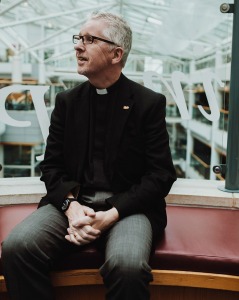Sheffield Cathedral – Year B – 25.01.18
Readings: Acts 9.1-22; Matthew 19.27-end
God has a disconcerting habit of bringing about the unexpected. Sinners find better places at the heavenly banquet table than those who see themselves as righteous; those whom the world sees as worthless are deemed of inestimable value in the sight of God; the last, the least, and the lost are certainly those on whom the gaze of Jesus rests in the Gospels. And, of course, the greatest act of the unexpected occurred when it was not death and a cross that had the last word, but life and an empty tomb.
God does the unexpected and uses unlikely people to accomplish things that, beforehand, no-one could have anticipated. Today’s feast, the conversion of Paul, is a striking example. Paul became a towering figure of Christianity, writing – or at least shaping – much of the New Testament outside of the gospels. After Jesus, Paul has had the greatest influence on the Church.
Yet Paul, Saul as he was before his conversion, had the most unlikely of beginnings. No-one could have expected Saul to turn out as he did. He was a zealous persecutor of the fledging church. We come across him first the Acts of the Apostles, standing by and endorsing the stoning of Stephen. He was no passive observer but approved the killing and soon after he was ‘ravaging the church by entering house after house; dragging off both men and women, he committed them to prison’ (Acts 8.3).
Again, at the start of this evening’s first reading, Luke writes: ‘Meanwhile Saul, still breathing threats and murder against the disciples of the Lord, went to the high priest and asked for letters to the synagogues at Damascus so that if he found any who belonged to the Way, men or women, he might bring them to Jerusalem’ (Acts 9.1-2).
Saul was a fanatical persecutor of Christians and certainly a man to be feared. But something happened on that journey to Damascus. We read of a dramatic event that was indeed a life-changing moment for Saul, but I think we need to also see it as part of a longer process. What effect, I wonder, did Stephen’s witness have on Saul as he faced his death like Jesus, asking God to forgive his persecutors?
Maybe Saul needed that extra push from God that happened on the Damascus Road to upset the certainty that drove him to persecute the followers of Jesus. For a while at least, Saul had an unshakeable belief that his cause was right. And yet his life changed, turning around completely to become the great missionary apostle. As Paul he took to the ends of the earth – the Rome of his day and the place where he would die a Christian martyr – the very message that he once so vehemently condemned.
What we see in the life of Saul who became Paul is one of the biggest U-turns in history. God did the unexpected in the life of a man who could not have been more certain that he was right. No wonder it took the followers of Jesus a little while to appreciate that this fearsome opponent of the early church had changed and, certainly, none of them could have anticipated what Paul would accomplish in his life for the sake of the gospel.
Paul’s life leaves us much to ponder about change and how open we are for God to do the unexpected, both in our own lives and in the lives of others. God sometimes does extraordinary things with and through those who we might regard as the unlikeliest of people. People can, and do, change for the better – even people we don’t like or perhaps even fear.
Paul’s life also reminds us that we might carry misplaced certainties in our own life that we hold to dearly, about which God is challenging us. Perhaps our theological views need review and refreshing; unexamined beliefs and practices that have become a habit; attitudes towards people of other faiths or towards Christians whose perspectives differ from our own.
Saul was convinced he was right to persecute the followers of Jesus, but it turned out that was wrong. We must be open enough to allow God to prompt us and bring about changes in our own lives wherever that is needed. Sometimes we get things wrong and we make mistakes, but we can learn from them. It’s not a sign of weakness to acknowledge when we are wrong about something – even if it is something we have clung to for a long time.
Life teaches us much along the way, and certainties can melt away in the light of experience. Principles count for little if we discover them to be wrong, something which the devout and zealous Saul discovered on the Damascus Road.
God does the unexpected; assumptions are challenged and firmly held beliefs can be shaken to the core. Sometimes it is necessary to let go. That is what Saul did and he went on to become the great apostle Paul. Who would have thought it? And who would have thought what God has in store for each of us if we remain open to God’s call.
So as we celebrate today the conversion of Paul may we be inspired by his life and legacy to all the followers of Jesus Christ, a movement that for a while he strove so hard to destroy, but for whom he then suffered and died.
